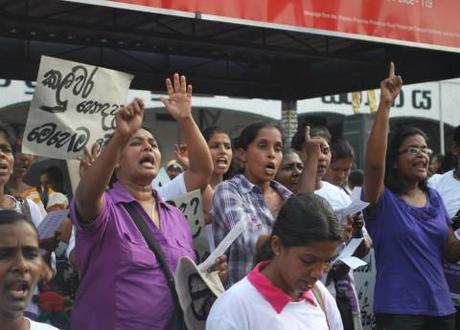
Protesting on International Women's Day in Sri Lanka. Photo credit: http://www.flickr.com/photos/vikalpasl/6818004070/in/photostream
Thursday marks the 101st International Women’s Day, the one day out of the year when the world gathers to thank and recognize women for their achievements. But it’s also a day to ask how far have women really come: Is it a time to celebrate – or to protest?
Emerging from the socialist Women’s movement in Europe and America, the first International Women’s Day (IWD) was held in 1911 at the instigation of Clara Zetkin, who had found unanimous approval for her idea a year earlier from the 100 women from 17 countries attending the second International Conference of Working Women in Copenhagen. Six years later, in 1917, this was the day that Russian women began the strike for “bread and peace” which precipitated the February Revolution. Since then, the movement has grown, with the United Nations holding an annual IWD conference and the day recognised as an official holiday in 27 countries, including Afghanistan, China (for women only), Cuba, Kyrgyzstan, Laos, Madagascar (for women only), Moldova, Nepal (for women only), and Russia.
How international is it? Britain is hosting 435 of the 1606 events worldwide according to figures posted on the IWD site. This is over 100 more than in the US (253), Canada (189), Australia (139) and Belize (135). At the other end of the spectrum, there are eight events taking place in United Arab Emirates and perhaps unsurprisingly, there are no events listed in Saudi Arabia, where women were recently barred from entering a Dunkin’Donuts shop without a male chaperone.
Different national approaches. While in Italy it is traditional to give presents of mimosa and chocolates, in Australia, the Herald Sun reported that Australian women were being encouraged to “get into more blokey activities” such as playing rugby, mining and peace-brokering in conflict zones.
Cause for celebration? Google honoured the day with one of it’s “doodles”, while Women in Film and TV released a “Powerlist” of the top 50 women in media, which alongside the Financial Times’s Top 50 Women in Business 2011 makes for cheering reading and demonstrates how far women have come. Women can now even buy “mengagement” rings to present to their intended from H.Samuel, showing that ladies no longer have to wait for men to pop the question.
Don’t break out the balloons quite yet. Cheering as the above lists may be, UN Women, a UN agency founded in 2010 to campaign for global gender equality, concluded in a recent report that no country in the world has so far achieved full gender parity. The statistics, such as these published by the UN on the worldwide situation and these for the UK from the Women’s Resource Centre make for grim reading. T Carla Buzasi, editor-in-chief of the Huffington Post UK decried this continuing inequality, especially in the media, and concluded, “It isn’t time to change these things. It is long past the time to change them.”
James Bond actor Daniel Craig, Dame Judi Dench and director Sam Taylor Wood marked last year’s IWD with this short video featuring Craig in drag.
Bad time to be a woman in Britain? In The Guardian, Polly Toynbee argued that today’s IWD marks the first era in living memory that the equality drive has gone into reverse, thanks to the coalition government crafting cuts around the model of a “male breadwinner with a dependent woman carer at home…removing the supports to independence and sending women home.” Britain, it seems, is a terrible place to be a woman. Well, maybe not so bad – The Independent on Sunday listed the best places to be a woman: Iceland came top overall, the UK clocked in at 16, and Yemen was the worst.
What can we do? Divide and conquer. Zoe Williams suggested in The Guardian that in order to achieve true equality, women should “act more like a football team and less like synchronised swimmers”. Right now, women are waiting for the impossible, agreement on an agenda which suits everyone; but, said Williams, “waiting for an unattainable unity is just another way of doing nothing. When we divide, we can burn more brightly in many places.”
No magic bullets: The example of Egypt. Mariz Tadros, co-editor with Analice Costa of Quotas: Add Women and Stir? commented in The Guardian on the fact that the new regime in Egypt has removed the quota that set aside 64 seats for women in the 500-plus seat parliament. The quota had introduced by former president Hosni Mubarak’s wife, Suzanne in 2009; its removal leaves the country with eight women out of 508 MPs, less than 2 percent. But research undertaken by the Pathways of Women’s Empowerment in four continents shows that quotas are not a magic bullet: A strong women’s movement championing equality and engaging women politically is what is really vital for long term change.
More on women
- Inspiring women to lead globally – the view from Dubai
- Women’s rights advocates blast Obama morning after pill decision
- Honour killings on the rise in the UK
- Women agitate for right to drive in Saudi Arabia
- Slutwalking across the globe
- Rush Limbaugh brands Georgetown student a ‘slut’, loses advertisers

